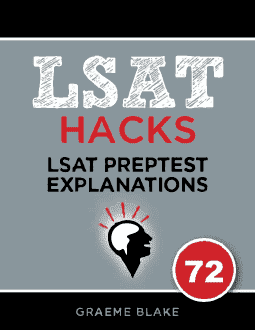QUESTION TEXT: Archaeologist: For 2,000 years the ancient Sumerians…
QUESTION TYPE: Weaken
CONCLUSION: Modern civilizations that rely heavily on irrigated agriculture will collapse.
REASONING: The Sumerians silted their soil with irrigation, and collapsed.
ANALYSIS: The author is assuming that what happened to the Sumerians will happen to us. The author implies that irrigation will inevitably deposit toxic salts and destroy soil.
But maybe we can learn from the Sumerians, and avoid destroying soil even if we irrigate.
___________
- This supports the idea that modern civilizations will collapse due to irrigation – we can’t survive without it. We’re trying to weaken the argument.
- The Sumerians were only mentioned to show that irrigation can lead to ruin. It doesn’t matter whether the Sumerians could have collapsed for other reasons – the argument is about our use of irrigation. The Sumerian example definitely shows that irrigation can cause problems.
- CORRECT. The toxic buildup of salts and other impurities was the reason irrigation destroyed Sumerian agriculture. If our irrigation avoids this problem, then our agriculture might not collapse due to irrigation.
- This is tempting. But look at the conclusion. It’s only talking about modern civilizations that do use irrigation.
- So? The point of the argument was that irrigation led to too many impurities in the soil. It doesn’t matter if there were already some impurities. Sumerian agriculture worked for a while even as impurities were building up. It’s not as if ancient Sumer instantly collapsed the moment the first impurity from irrigation entered the soil.


Hey Graeme,
I dismissed C because it used the term “Many” which is rather weak in and of itself. Was that a bit too technical?
Yes. Of course, on strengthen/weaken questions, you do want to interpret some/many/most etc. at their weakest.
But your job doesn’t stop there. You then have to ask “At the weakest interpretation of this word, does this answer weaken the argument”?
In this case, yes. “Many” is vague and context dependent, here I’d say “many” farmers would be something like minimum 20-30%. This tells us two things:
1. A sizeable chunk of farmers are avoiding the problem
2. We know how to avoid a problem. If the larger group of farmers starts destroying the soil, they can probably copy the effective farmers.
You might argue the second point is unsupported. But it’s a reasonable common sense judgement, and we’re not trying to absolutely destroy the argument. We’re just trying to poke a hole in it, and the two points above do that (or even the first on its own, though the second is well supported).
You can use keywords to make probable judgements about answers, but you still have to think about them before dismissing them.
Hey,
I was stuck between C and D, but I ended up choosing D. I didn’t pick C because it said “Many modern FARMERS”…because farmers is out of scope. Aren’t weaken answers supposed to be within the scope of argument?
Forget about “scope”. It’s a meaningless word used by Kaplan when they don’t know how to otherwise explain why an answer is wrong. “Out of scope” = irrelevant. It doesn’t mean anything in and of itself.
If something’s relevant to an argument, then it can be the right answer. And farmers are definitely relevant to agriculture! There is no agriculture without farmers. So if farmers can irrigate safely then agriculture will be ok.
Banish the idea “out of scope” from your toolkit. It’s worse than useless.